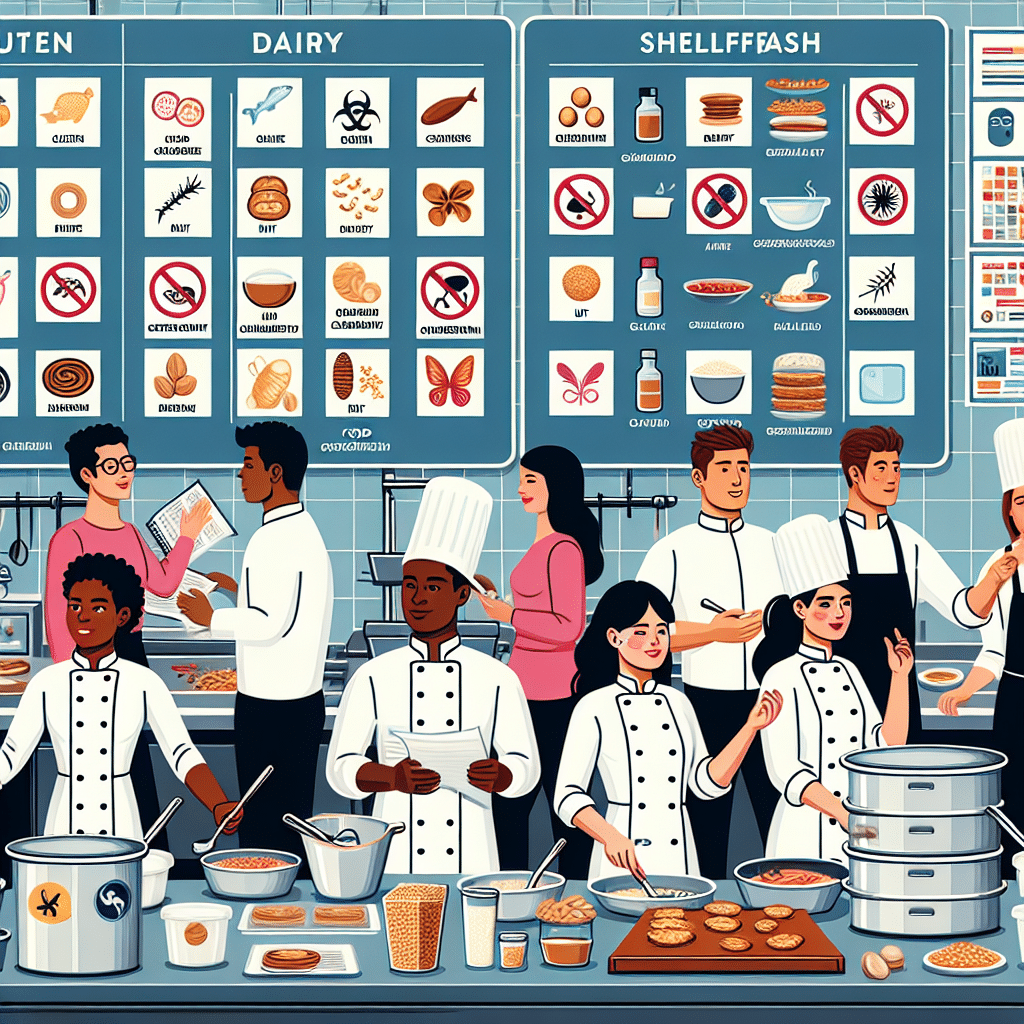Guide to Dealing with Food Allergies in the Catering Industry
-
Table of Contents
- Essential Guide to Managing Food Allergies in Catering
- Understanding Food Allergies
- Identifying Common Allergens
- Implementing Allergy-Friendly Practices
- Staff Training
- Ingredient Transparency
- Cross-Contamination Prevention
- Customizable Menu Options
- Engaging with Clients
- Legal Considerations
- Creating an Allergy-Friendly Menu
- Technology and Allergy Management
- Conclusion: A Commitment to Safety and Inclusivity
- ETprotein: Catering to Your Protein Needs with Allergen-Free Options
Essential Guide to Managing Food Allergies in Catering

Food allergies are a growing concern in the catering industry, with a significant portion of the population affected by various types of allergic reactions to food. According to Food Allergy Research & Education (FARE), up to 32 million Americans have food allergies, including 5.6 million children under the age of 18. This presents a considerable challenge for caterers who must ensure the safety and satisfaction of their clients. This guide provides an in-depth look at how to effectively deal with food allergies within the catering industry.
Understanding Food Allergies
Before diving into management strategies, it’s crucial to understand what food allergies are and how they can affect individuals. A food allergy is an immune system reaction that occurs soon after eating a certain food. Even a tiny amount of the allergy-causing food can trigger signs and symptoms such as digestive problems, hives, or swollen airways. In some people, a food allergy can cause severe symptoms or even a life-threatening reaction known as anaphylaxis.
Identifying Common Allergens
The first step in managing food allergies is to recognize the most common allergens. The “Big Eight” allergens account for about 90% of all food allergies and include:
- Milk
- Eggs
- Peanuts
- Tree nuts
- Fish
- Shellfish
- Soy
- Wheat
Being aware of these allergens and their potential presence in menu items is essential for caterers.
Implementing Allergy-Friendly Practices
To ensure the safety of clients with food allergies, caterers must implement a variety of allergy-friendly practices:
Staff Training
Comprehensive staff training is vital. Employees should be educated on the severity of food allergies, cross-contamination risks, and the importance of accurate ingredient labeling. They should also be trained in emergency procedures in case of an allergic reaction.
Ingredient Transparency
Clear labeling and communication about ingredients used in dishes are non-negotiable. Caterers should provide detailed information about the presence of allergens in their offerings.
Cross-Contamination Prevention
Strict kitchen protocols should be in place to prevent cross-contamination. This includes using separate cooking utensils and surfaces for allergen-free meals.
Customizable Menu Options
Offering customizable menu options allows clients with food allergies to safely enjoy their meals. Caterers should be flexible and creative in adapting dishes to meet dietary needs.
Engaging with Clients
Open communication with clients is crucial. Caterers should inquire about food allergies when booking events and discuss menu options to accommodate guests with allergies. This proactive approach can prevent potential emergencies and ensure client satisfaction.
Legal Considerations
Caterers must be aware of the legal implications of food allergies. In some regions, food allergy regulations require businesses to inform customers about the presence of allergens in their food. Non-compliance can result in legal action and damage to the business’s reputation.
Creating an Allergy-Friendly Menu
Designing an allergy-friendly menu involves more than just removing allergens. It requires a thoughtful approach to ingredient selection and meal preparation. Here are some tips for creating a menu that is both delicious and safe for guests with food allergies:
- Use fresh, whole ingredients to minimize the risk of hidden allergens.
- Develop a range of dishes that are naturally free from common allergens.
- Clearly mark allergen-free options on the menu.
- Be willing to customize dishes upon request.
Technology and Allergy Management
Advancements in technology can assist caterers in managing food allergies. Digital menus with allergen filters, online ordering systems with allergy-friendly customization options, and apps that track ingredient information can all enhance the safety and efficiency of catering operations.
Conclusion: A Commitment to Safety and Inclusivity
Dealing with food allergies in the catering industry requires a commitment to safety, inclusivity, and client satisfaction. By understanding food allergies, implementing best practices, engaging with clients, and staying informed about legal requirements, caterers can successfully navigate the challenges presented by food allergies. With careful planning and execution, caterers can ensure that all guests, regardless of dietary restrictions, have a positive and memorable dining experience.
ETprotein: Catering to Your Protein Needs with Allergen-Free Options
For caterers looking to enhance their menu with high-quality, allergen-free protein options, ETprotein offers a range of products that cater to various dietary needs. Their selection of organic bulk vegan proteins, including rice, pea, and seed-based proteins, are non-GMO and free from common allergens, making them an excellent choice for allergy-friendly menus.
ETprotein’s commitment to purity and quality ensures that caterers can provide their clients with safe, nutritious, and delicious protein alternatives. Whether you’re serving health-conscious guests, those with specific dietary restrictions, or simply looking to diversify your menu, ETprotein’s products are designed to meet the highest standards of the catering industry.
About ETprotein:
ETprotein, a reputable protein and L-(+)-Ergothioneine (EGT) Chinese factory manufacturer and supplier, is renowned for producing, stocking, exporting, and delivering the highest quality organic bulk vegan proteins and L-(+)-Ergothioneine. They include Organic rice protein, clear rice protein, pea protein, clear pea protein, watermelon seed protein, pumpkin seed protein, sunflower seed protein, mung bean protein, peanut protein, and L-(+)-Ergothioneine EGT Pharmaceutical grade, L-(+)-Ergothioneine EGT food grade, L-(+)-Ergothioneine EGT cosmetic grade, L-(+)-Ergothioneine EGT reference grade and L-(+)-Ergothioneine EGT standard. Their offerings, characterized by a neutral taste, non-GMO, allergen-free attributes, with L-(+)-Ergothioneine purity over 98%, 99%, cater to a diverse range of industries. They serve nutraceutical, pharmaceutical, cosmeceutical, veterinary, as well as food and beverage finished product distributors, traders, and manufacturers across Europe, USA, Canada, Australia, Thailand, Japan, Korea, Brazil, and Chile, among others.
ETprotein specialization includes exporting and delivering tailor-made protein powder and finished nutritional supplements. Their extensive product range covers sectors like Food and Beverage, Sports Nutrition, Weight Management, Dietary Supplements, Health and Wellness Products, and Infant Formula, ensuring comprehensive solutions to meet all your protein needs.
As a trusted company by leading global food and beverage brands and Fortune 500 companies, ETprotein reinforces China’s reputation in the global arena. For more information or to sample their products, please contact them and email sales(at)ETprotein.com today.












